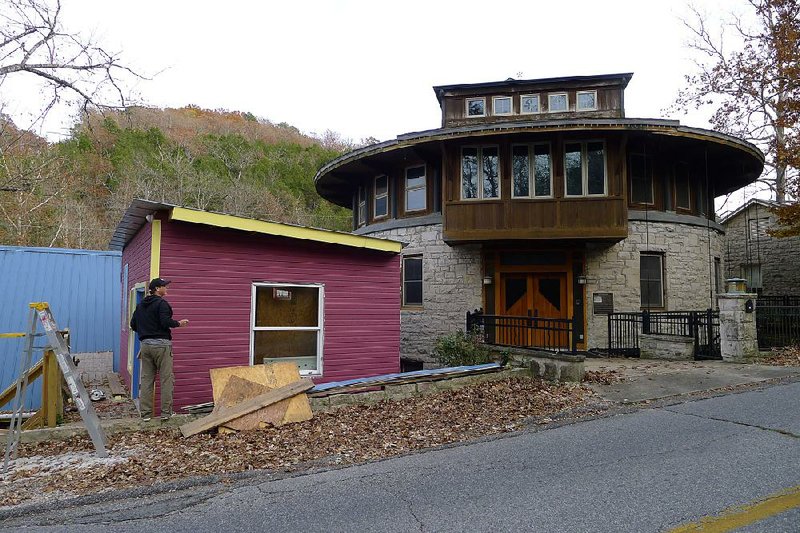The city of Eureka Springs will pay $40,000 to get rid of a shed.
That figure was reached after more than a year of litigation in federal court and a 10-hour settlement conference.
Tom Kieklak, a lawyer representing the city, revealed the dollar amount at a Eureka Springs City Council meeting Monday night.
"The shed that was built next to The Roundhouse will be removed within 120 days," he told the council. "All claims against everyone will be dismissed ... and no fault will be admitted."
The council agreed by a vote of 4-2.
Kieklak told the council details of the settlement will be public, and he'll be drafting those documents for the parties to sign.
Twyla Pease of Cumming, Iowa, filed a federal suit in November 2017 saying her neighbor, Josh Cook, had built an "unsightly" shed in his backyard. She wanted the shed torn down and/or $300,000 in damages.
Pease named the city as a defendant because its Historic District Commission had approved construction of the shed. Eureka Springs has strict rules regarding construction in its Historic District.
"It looks like a shanty out there," said Tim Parker, a Eureka Springs lawyer representing Pease. "It looks horrible."
In the lawsuit, Parker wrote: "The financial value, historical value, visual ambiance and view to and from The Roundhouse has been ruined."
The two-story shed is just a few feet from the front door of the century-old Roundhouse, a four-story stone and wood structure that is owned by Pease and The Pease Family Trust.
The house is round because its foundation was initially built to hold a round tank of coal gas used to light the city's streets and homes. Later, it was a storage building for Ozarka Spring Water Co., which was founded in Eureka Springs and is now based in Texas.
The hilly terrain of Eureka Springs has made this a unique situation.
Although the two buildings are next door to each other, they face different streets that are on different elevations. The Roundhouse's front door is on the building's third floor and faces Hillside Avenue. The front door is angled toward the shed.
The house next door, where Cook lives, is owned by his mother-in-law, Becky Gillette, who is a reporter for the Eureka Springs Independent, a weekly newspaper. The front door of that house faces Main Street.
That means Gillette's backyard is next to the front yard of The Roundhouse. When driving south on Hillside Avenue, the shed appears to be in Gillette's front yard, according to the suit.
In 2017, Pease said The Roundhouse was for sale, and the shed was shooing off potential buyers.
A real estate agent told her one potential buyer said, "I don't want to live next to that," referring to the shed.
Erin L. Wiedemann, the U.S. magistrate judge in the case, issued a gag order saying those involved in the Jan. 24 settlement conference aren't allowed to talk about it.
"I cannot discuss the case by order of the magistrate," said Kristine Kendrick, the attorney for Gillette and Cook.
Gillette, however, did say, "The shed is coming down. It's being donated to a family that has four kids in a one-bedroom house."
Kieklak told the council that only the top floor of the shed must be removed under the settlement agreement. That's the part above street level.
But Cook said in a 2017 interview that there is only room for a 40-square-foot basement of sorts on the ground floor of the shed because of the proximity of Gillette's house to a retaining wall.
Parker said the Historic District Commission "messed up" by not revealing to Pease that her neighbor was building a two-story shed. She thought it was going to be one story. He said the permitting process began in 2015.
"They didn't tell us what the elevation was going to be, and they're supposed to," said Parker.
"I should never have had to spend hundreds of hours getting done what should have been done when we called everybody's attention to this fact," he said. "This should have been fixed early on rather than with protracted litigation."
Besides being a storage shed, the building served as a shop for Cook, who makes knives.
"My life savings is in this," he said in 2017. "Everything I've got."
Pease said in 2017 that she asked Cook then about buying viewshed rights, but he told her he had already invested about $40,000 in the shed and wasn't willing to tear it down.
Parker said a judge earlier in the case ruled that Arkansas law doesn't grant a person a right to a "view."
"This was in response to our claim that one of the windows in the upper floor of the shed looked directly into one of the windows of The Roundhouse," Parker said in an email. "In addition, we alleged and provided proof with pictures that the shed clearly violated numerous guidelines of the Eureka Springs Historic District such as being attached to the main building and having a roof shape that did not match that of the main building."
There were other violations alleged, wrote Parker.
"The judge never issued a ruling on our allegations because the parties reached a settlement at the settlement conference in the case thus alleviating the need to obtain such a ruling," he wrote.
Eureka Springs Mayor Robert "Butch" Berry said he hopes everybody "feels good" about the settlement.
"It's an interesting dynamic for historic districts," he said.
Metro on 02/01/2019
